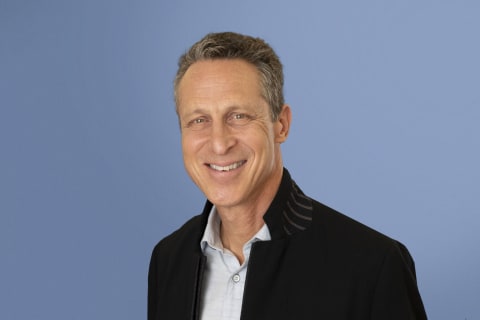Advertisement
What This Functional MD Says To Eat (& Avoid) For Deep Sleep

How easily do you fall asleep at night? Are you snoozing as soon as your head hits the pillow, or do you tend to toss and turn for what feels like hours? Do you wake up in the middle of the night and can't get back to sleep?
I always say that using food as medicine can dramatically improve not only your sleep quality but also your sleep duration, sleep drive, and nearly every pillar of health associated with sleep (and overall health, in general).
I've spent decades helping patients optimize their sleep through diet, and I've compiled my experience into an extensive Sleep Masterclass. In it, you'll find exactly how I use food as medicine (both what to enjoy as well as what to avoid) to support faster, deeper, and better sleep at night. Here's a sneak peek:
How to eat your way toward better sleep.
The key to eating your way to better sleep is prioritizing foods that help balance your blood sugar and feed your gut with beneficial probiotics and prebiotics.
When you eat ingredients that are balanced in healthy fats, proteins, and carbs, you avoid blood sugar extremes that stress the body and derail sleep. Research is now showing that a variety of gut bacteria are responsible for synthesizing things like B vitamins6, GABA7, and 5-HTP8, which are all essential to sleep (as well as energy, mood, relaxation, and more). This means that eating whole foods that cultivate a healthy and thriving gut microbiome and keep blood sugar balanced will also support high-quality rest.
With this in mind, my ideal daily meal plan for sleep support looks a little something like this:
- For breakfast, I recommend two to three eggs and spinach, mushrooms, peppers, and onion sauteed in grass-fed butter, ghee, or coconut oil. It's a quick, well-rounded meal packed with healthy fats, protein, and a small amount of smart carbs. This combination will help keep your blood sugar balanced and is loaded with fiber, which helps keep your gut bacteria happy.
- Lunch is a green salad with salmon, avocado, and artichokes (a wonderful source of gut-healthy prebiotic fiber), drizzled in olive oil and balsamic vinegar. Again, this is a balanced, fiber-rich meal that should leave you satiated until dinner. (But if it doesn't, snack on a handful of nuts or seeds, hard-boiled eggs, or pasture-raised beef jerky.)
- Dinner is a plate of Brussels sprouts, onions, garlic, and mushrooms drizzled in avocado oil and baked, a palm-size portion of grilled chicken, and possibly half a medium baked yam depending on your age and activity level, or another serving of steamed veggies, like broccoli or cauliflower. Adding fermented foods like sauerkraut or kimchi will further feed gut health, and sleep by extension.
Eating your meals at similar times each day can get your body into a rhythm, which will also help you start to feel tired at the same time every night. I recommend wrapping up your last meal two to three hours before you plan to go to bed to give yourself time to transition into sleep mode. This gives your body a chance to fully digest your last meal prior to lying down, so it can fully focus on sleeping instead of digesting.
In addition to turning off the feeding prior to bed, also turn off your devices, smartphones, TVs, computers, etc., and turn down your lights. Your sleep drive is directly affected by light, so reducing light exposure at night (and getting bright light exposure in the morning) can significantly improve sleep. This is also a great time to take a warm shower or Epsom salt bath, wind down with a book, or engage in deep conversation with family or friends—all relaxing techniques that set the tone for deep, high-quality sleep.
Learn more in My Sleep Masterclass.
These meal suggestions, eating tips, and relaxation techniques only scratch the surface of the gut-sleep connection. For the complete list of foods to eat, limit, and avoid for sleep, along with some of my all-time favorite recipes that promote rest, check out my Sleep Masterclass.
Beyond food, it dives into how everything from your lighting to your hormones can affect sleep and will leave you with the tips you need to optimize each one. Over the course of four-plus hours of instruction split into eight bite-size modules, I chat with a leading panel of sleep experts to share science-backed tips for sleeping through the night; the best sleep tools, gadgets, and supplements on the market today; and a 10-day sleep reset that you can try with the approval of your doctor.
By the end of the course, you should have a good idea of what great sleep really feels like and know exactly how to get it.
The bottom line.
Using the power of food as medicine and focusing on whole, gut-friendly foods is one way to set the foundation for better rest. I truly believe that great sleep helps us wake up every day feeling happy, focused, and healthy—and who isn't hungry for that?

Dr. Mark Hyman is a practicing family physician and an internationally recognized leader, speaker, educator, and advocate in the field of Functional Medicine. He is the founder and director of The UltraWellness Center, the Head of Strategy and Innovation of the Cleveland Clinic Center for Functional Medicine, a 13-time New York Times best-selling author, and Board President for Clinical Affairs for The Institute for Functional Medicine. He is the host of one of the leading health podcasts, The Doctor’s Farmacy. Dr. Hyman is a regular medical contributor on several television shows and networks, including CBS This Morning, Today, Good Morning America, The View, and CNN. He is also an advisor and guest co-host on The Dr. Oz Show.
More from the author:
Functional Nutrition Training
Check out Functional Nutrition Coaching
A cutting-edge nutrition deep dive taught by 20+ top health & wellness experts
Learn moreMore from the author:
Functional Nutrition Training
Check out Functional Nutrition Coaching
A cutting-edge nutrition deep dive taught by 20+ top health & wellness experts
Learn more
Dr. Mark Hyman is a practicing family physician and an internationally recognized leader, speaker, educator, and advocate in the field of Functional Medicine. He is the founder and director of The UltraWellness Center, the Head of Strategy and Innovation of the Cleveland Clinic Center for Functional Medicine, a 13-time New York Times best-selling author, and Board President for Clinical Affairs for The Institute for Functional Medicine. He is the host of one of the leading health podcasts, The Doctor’s Farmacy. Dr. Hyman is a regular medical contributor on several television shows and networks, including CBS This Morning, Today, Good Morning America, The View, and CNN. He is also an advisor and guest co-host on The Dr. Oz Show.
8 Sources
- https://www.ncbi.nlm.nih.gov/labs/pmc/articles/PMC2656292/
- https://www.ncbi.nlm.nih.gov/labs/pmc/articles/PMC4377487/
- https://www.ncbi.nlm.nih.gov/labs/pmc/articles/PMC6456824/
- https://pubmed.ncbi.nlm.nih.gov/23319909/
- https://pubmed.ncbi.nlm.nih.gov/25772315/
- https://www.frontiersin.org/articles/10.3389/fnut.2019.00048/full
- https://www.nature.com/articles/s41564-018-0307-3
- https://pubmed.ncbi.nlm.nih.gov/33481771/
